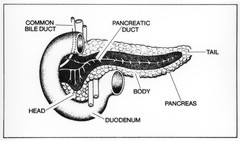Discuss the role of hepato – pancreatic complex in digestion of carbohydrate, protein and fat components of food.
The hepato – pancreatic complex plays a major role in the digestion of carbohydrates, proteins and fats.
Role of Liver: Liver secretes bile juice. Bile helps in emulsification of fats. Bile also provides alkaline medium which is useful for working of enzymes present in the small intestine.
Role of Pancreas: here pancreatic juice is secreted. The pancreatic juice contains inactive enzymes trypsinogen, chymotrypsinogen, procarboxypeptidases, amylases, lipases and nucleases. Trypsinogen is activated by an enzyme, enterokinase, (secreted by the intestinal mucosa) into active trypsin, which in turn activates the other enzymes in the pancreatic juice. Amylase digests carbohydrates and trypsin/chymotrypsin digests protein.
Pancreatic juice and bile are released through the hepato-pancreatic duct. The bile released into the duodenum contains bile pigments (billirubin and billiverdin), bile salts, cholesterol and phospholipids but no enzymes. Bile also activates lipases, which converts triglycerides into di and monoglycerides.

The action of hepato-pancreatic secretion on digestion on carbohydrate, proteins and fats are summarised below
(i) Carbohydrates in the chyme are hydrolysed by pancreatic amylase into disaccharides.
Polysaccharides (starch) ![]() Disaccharides
Disaccharides
(ii) Fats are broken down by lipases with the help of bile into di and monoglycerides
Triglycerides ![]() Emulsified triglycerides
Emulsified triglycerides ![]() diglycerides → Monoglycerides
diglycerides → Monoglycerides
(iii) Proteins in the chyme reaching the intestine are acted upon by the proteolytic enzymes of pancreatic juice.
